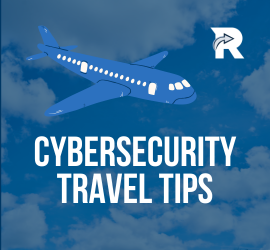
When you’re traveling it's important to take precautions in regard to cyber security. Hackers can target you for many reasons during your trip.
“Disable remote connectivity and Bluetooth. Some devices will automatically seek and connect to available wireless networks. And Bluetooth enables your device to connect wirelessly with other devices, such as headphones or automobile infotainment systems. Disable these features so that you only connect to wireless and Bluetooth networks when you want to.” (NCDIT).
Multi-factor authentication is also a good tool for traveling, but also in general for every life.
“Enable multi-factor authentication (MFA) to ensure that the only person who has access to your account is you. Use it for email, banking, social media, and any other service that requires logging in. If MFA is an option, enable it by using a trusted mobile device, such as your smartphone, an authenticator app, or a secure token—a small physical device that can hook onto your key ring.” (CISA).
The information that you share about your travels online could have consequences.
“Limit what information you post on social media—from personal addresses to where you like to grab coffee. What many people don’t realize is that these seemingly random details are all that criminals need to know to target you, your loved ones, and your physical belongings—online and in the real world. Keep Social Security numbers, account numbers, and passwords private, as well as specific information about yourself, such as your full name, address, birthday, and even vacation plans. Disable location services that allow anyone to see where you are—and where you aren’t— at any given time.” (CISA).
Hotspots are another area of concern when you’re traveling.
“Before you connect to any public wireless hotspot—such as at an airport, hotel, or café—be sure to confirm the name of the network and exact login procedures with appropriate staff to ensure that the network is legitimate. If you do use an unsecured public access point, practice good Internet hygiene by avoiding sensitive activities (e.g., banking) that require passwords or credit cards. Your personal hotspot is often a safer alternative to free Wi-Fi.” (CISA).
Overall, cybersecurity should be a top concern when you’re leaving home due to the risks it presents.
“Cybersecurity should not be limited to the home, office or classroom. It is important to practice safe online behavior and secure internet-enabled mobile devices whenever you travel, as well. The more you travel and access the internet on the go, the more cyber risks you face. No one is exempt from the threat of cybercrime, at home or on the go, but you can follow these simple tips to stay safe online when traveling.” (NCDIT).
Want to learn more about improving cyber security? Responsive Technology Partners is the leading cyber-security expert in the Athens, Metter, Milledgeville, Vidalia, and Atlanta, Georgia areas. We also have locations in Tampa, Florida, Roanoke, Virginia, and Raleigh, North Carolina. Service offerings include I.T. support, cyber-security and compliance, cloud-based POS systems and support, telephony, cloud services, cabling, access control, and camera systems. Our company’s mission is to provide world-class customer service through industry leading I.T. solutions that make every customer feel as if they are our only customer. Please visit our website to learn more: https://www.responsivetechnologypartners.com/.
Sources:
NCDIT. https://it.nc.gov/resources/online-safety-privacy/tips-guidance/cybersecurity-while-traveling




